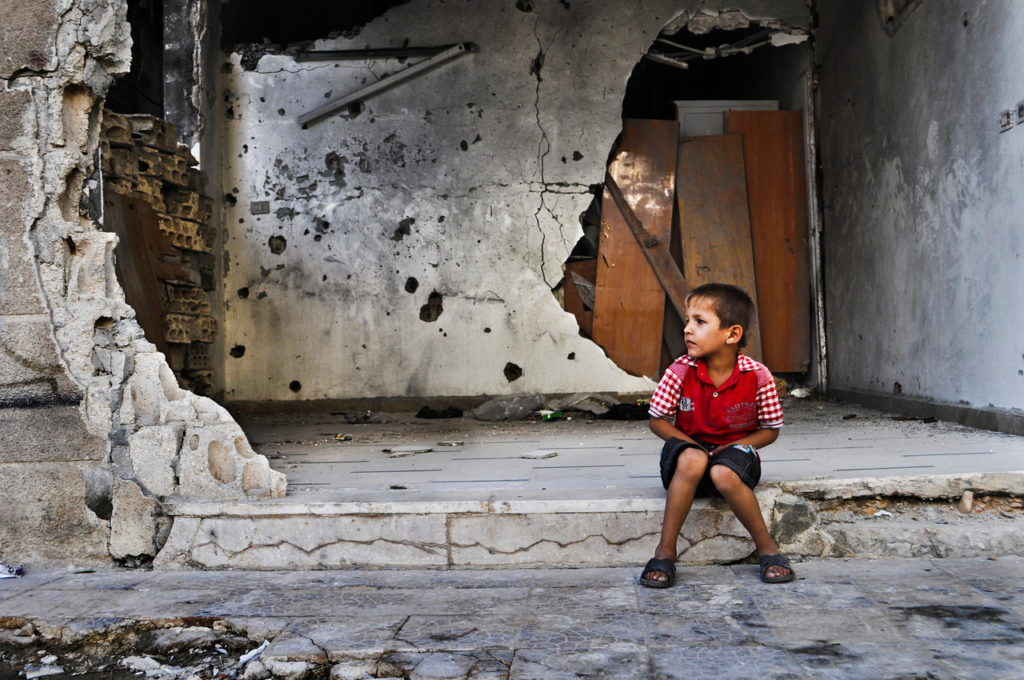Dystopia: Future or Present?

Photo: WFP/Abeer Etefa
Imagine a society in a mess. Some would argue that mess is right here in the present times. Then picture a further decayed form of the present society. That is dystopia.
Devoid of a set definition, dystopia is a future state or society in which man is suffering from excessive technological interference, autocratic governments, totalitarian states , lack or extinction of resources and other worse atrocities. The term ‘Dystopia’ was first used by the essayist John Stuart Mill as an antonym to Sir Thomas More’s ‘Utopia’ which is an idealistic society or world where mankind is happy and progressing. While the term was coined in the nineteenth century, it gained momentum in the early twentieth century, the century of world wars and dictators like Hitler.
There is an intriguing parallel that exists between Utopia and Dystopia. The technology in Dystopia, at its most advanced stage, is contributing only to the torment of the beings. For instance, in Philip K. Dick’s famous dystopian short story ‘Minority Report’, the protagonist works for ‘pre-crime’- an organisation responsible to arrest the criminals even before the crime happens. This leads to an utter chaos in the society where crime is no more happening and yet the pre-crime kills those who commit it in future. This scenario is inverted in Utopia. Technology, at its peak, is only contributing to the good of mankind.
‘Literature and Dystopia’ are mutually exclusive terms and yet they have a relationship. ‘Brave New World’ by Aldous Huxley is considered first dystopian novel. Published in 1932, the book is brimming with genetically enhanced characters. Class hierarchy is based on intelligence where alphas are supreme. Other popular dystopian writers are George Orwell and Philip K. Dick.
Dystopia is a wide term and ample situations can be categorised as dystopia. Alan Moore’s ‘V for Vendetta’ deals with neo-fascist totalitarian government having extreme right political views. Fascism and totalitarianism become almost synonymous with dystopia as they are depicted as cruel and rigid in their approach. Class hierarchies are maintained even at the cost of mass-killings. Capitalism has reached its advanced stage and familial/romantic relationships hold no or negligible significance. This was a slightly technical part of dystopia. Situations as simple as fight for survival are also a part of modern dystopia, where natural resources are either exhausted or only available to the upper class or selected people. In a recent dystopian novel ‘Leila’ by Prayaag Akbar, drinking water is only available on ATMs and not everyone can drink it. Even though they have the money, only people who are of pure race and not doosh (people of mixed race) can drink it.
Cinema has consistently played with Dystopia as a genre. Elements of science-fiction and cyberpunk are merged with Dystopia in many films and television series. Extremely popular trilogy ‘The Matrix’ might seem a work of science-fiction but it has strong dystopian undercurrents. The movie showcases scientific modifications in a drastic light. Science interferes in such a way that humans have ceased to be born, they are created like a science experiment. Everything exists in stimulation with zero human intervention. Similar is the film ‘Equilibrium’ where autocratic government led by Father has banned sensing or feeling. The film ‘Mad Max: Fury Road’ shows water as a ‘private property’ and only belongs to the king, not to common people. Dystopian cinema has a big share in spreading awareness about the concept.
At the concluding note, Dystopia can be called an inevitable phenomenon which can not be delayed anymore. Be it Syria or Palestine, signs of dystopia are apparent. In India, three major and most populous cities are suffering- Chennai is drought ridden, Mumbai is flooded and Delhi is choking from air pollution. America is crawling backwards with the new abortion laws. Fascism is at rise globally. This is dystopia not in future but in the present.
(Article submitted by Priya Gupta)

2 Replies to “Dystopia: Future or Present?”
This is really a rich article Priya. Thoughtful, provoking, rational, unconventional and I just get to learn something new. Keep writing. 🎈
Thank you so much!